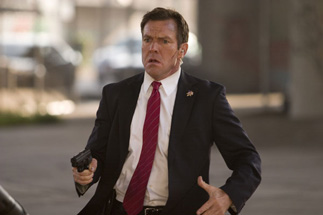Movie Review: Vantage Point
By Matthew Huntley
March 18, 2008
BoxOfficeProphets.com

In the movie, an assassination attempt is made on the President of the United States at a world peace summit, after which a bomb goes off. Every ten minutes or so, we'll see this event take place from a different perspective. At the end of each one, the movie rewinds back to 12:00 p.m. and starts over again. This strategy alone proves frustrating because the cliffhanger at the end of each segment doesn't make us curious or anxious about what we've just seen or what might happen. It discourages us more than anything.
Several Web sites are comparing the movie to Kurosawa's Rashomon, which pioneered the idea of telling a story from different views, suggesting truth and knowledge are relative. This has become a common strategy used in other films like Courage Under Fire and Atonement. But unlike those movies, Vantage Point doesn't hinge on any one truth. It's simply showing how different characters can intertwine around one event.
The problem is that the plot of Vantage Point is but a generic assassination conspiracy, and so its method of storytelling ends up being inconsequential since we don't really care what happens. We've seen it before. A terrorist organization plans to kidnap and kill the president because the United States thwarted one of their prior plans of attack. In this post-9/11 era, it's very easy for screenwriters to simply label bad guys "terrorists" and for actors to speak with Middle Eastern accents. The terrorists' motivations and personalities needn't be developed so long as we know they're the evildoers.
When the final piece of the puzzle is put in place, the story descends into another run-of-the-mill car chase, this time on the streets of Salamanca, Spain. Maybe the filmmakers thought setting the climax in a different city would make it fresher. While the stunts and editing of this sequence are slick and well crafted, it goes on for too long. It badly wants to be like The Bourne Identity and The Italian Job and we can sense its desperation.
On top of that, the movie is just plan ridiculous. I know one has to accept some compromises with reality when going to the movies, but Vantage Point takes this to an extreme. Near the end of the chase, a car speeds along at about 40 miles an hour. It's hit side-on by a semi and then rammed into a brick wall. Seconds later, the person driving the car emerges without so much as a bruise, scratch or limp. Really? The movie's credibility, which was never very high to begin with, just kept deflating.
And maybe you can shed some light on this: when the head terrorist calls his Spanish accomplice, he speaks to him in Spanish. But a text message he sends to him later on is written in English. Normally such inconsistencies wouldn't bother me, but Vantage Point leaves itself open to minute criticism.
With such an impressive cast - Dennis Quaid and Matthew Fox as Secret Service agents; William Hurt as the president; Sigourney Weaver as a news director; Forest Whitaker as a tourist with a video camera - it's a shame Vantage Point settles for being a frivolous exercise in editing, complemented by an ending that's so absurd and mawkish it becomes unintentionally funny. At least on that level we're able walk away slightly amused rather than overly offended.